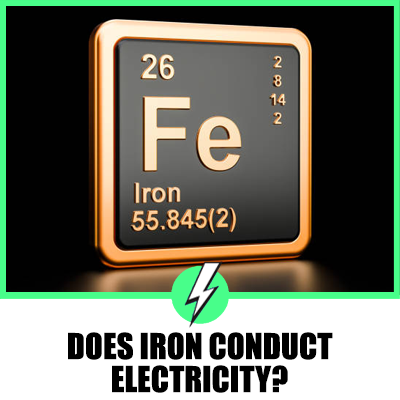Does Iron Conduct Electricity? A Comprehensive Analysis for the UK and US Audience
In the world of metals, iron stands out for its wide range of applications.
From the towering skyscrapers of New York and London to the humble cooking pots in homes across Ohio and Yorkshire, iron is a material that is both versatile and ubiquitous.
But one question that often arises is, does iron conduct electricity?
This article will delve into the properties of iron, its ability to conduct electricity, and how it compares to other metals in terms of conductivity.

Contents
Is an iron a Conductor or Insulator?
Iron, being a metal, is a conductor of electricity.
It has eight valence electrons that can dislocate or migrate to conduct the flow of electricity.
However, compared to other metals, iron’s conductivity is not the highest.
This is due to its magnetic moment, which causes the electrons to spin relatively, reducing the flow and agility of the charge.
This decrease in the velocity of charges lowers the electric flux flow rate and hence the conductivity of the iron.
Is Iron a Bad Conductor of Electricity?
While iron is a conductor of electricity, it is not the best.
Compared to metals like silver, copper, gold, and aluminum, iron’s conductivity is lower.
This is primarily due to its ferromagnetic nature, which means it has magnetic moments that can hinder the flow of charges.
However, iron is still a good conductor of heat and is used in various applications due to this property.
Does Iron Resist Electric Current?
Iron does resist electric current, but not as much as insulators do.
The resistance of an iron wire is given by the formula R = ρL/A, where R is resistance, ρ is the resistivity of iron, L is the length of the wire, and A is the cross-sectional area of the wire.
The resistance of iron increases with temperature, which can reduce its conductivity.
Which Materials Are Good Conductors of Electricity?
Several materials are excellent conductors of electricity.
Silver is the greatest metallic conductor on earth, followed by copper, gold, and aluminum.
These metals are often used in wiring, household appliances, and other electrical applications due to their high conductivity and other beneficial properties.
Iron in the UK and US
In both the UK and the US, iron is widely used in various industries.
In the construction industry, for example, iron is used in the form of steel, an alloy of iron and carbon, to build skyscrapers, bridges, and other structures.
In the electrical industry, iron is used in transformers and motors due to its magnetic properties.
Despite its lower electrical conductivity compared to other metals, iron’s other properties make it a valuable material in these applications.
Insights from Online Discussions
Online discussions provide a wealth of information about iron’s electrical conductivity.
For example, a discussion on Lambda Geeks explains that iron can conduct electricity due to its eight valence electrons.
However, its magnetic moment reduces the flow and agility of the charge, making it a good but not the best conductor of electricity.
Another discussion on Biotrux further elaborates on iron’s conductive properties.
It explains that iron’s conductivity reduces with an increase in temperature, but it is a better conductor of heat.
It also highlights that while iron may not be the best conductor of electric current, it has numerous real-life applications.
The Role of Iron in Technology
Iron’s ability to conduct electricity, albeit not as efficiently as some other metals, has made it a crucial component in many technological applications.
For instance, in the realm of telecommunications, iron is used in the manufacturing of various components due to its magnetic properties.
In the automotive industry, iron is used in the creation of car bodies, engines, and more.
Its use extends to everyday appliances like refrigerators, washing machines, and ovens, where it forms a part of electrical circuits and heating elements.
Iron and Sustainability
In the context of sustainability, iron plays a significant role.
Iron is one of the most abundant elements on Earth, making it a readily available resource.
Furthermore, iron is highly recyclable, contributing to its sustainability.
In both the UK and the US, efforts are being made to increase the recycling of iron to reduce the environmental impact of mining and processing new iron.
Conclusion
In conclusion, iron is a good conductor of electricity, but not the best due to its magnetic moments.
Its conductivity reduces with an increase in temperature, but it is a better conductor of heat.
Despite not being the best conductor of electricity, iron has numerous real-life applications, making it a valuable material in various industries.
Whether in the UK or the US, understanding the properties of materials like iron is crucial in fields like construction, electronics, and more.
This understanding allows us to harness these materials effectively and innovate for the future.





